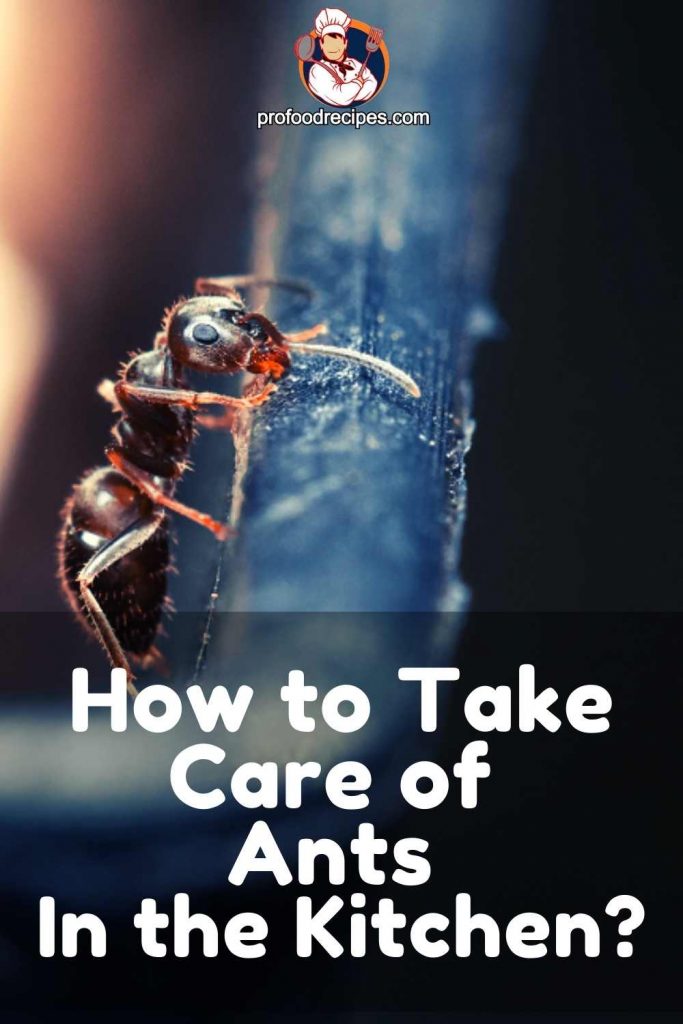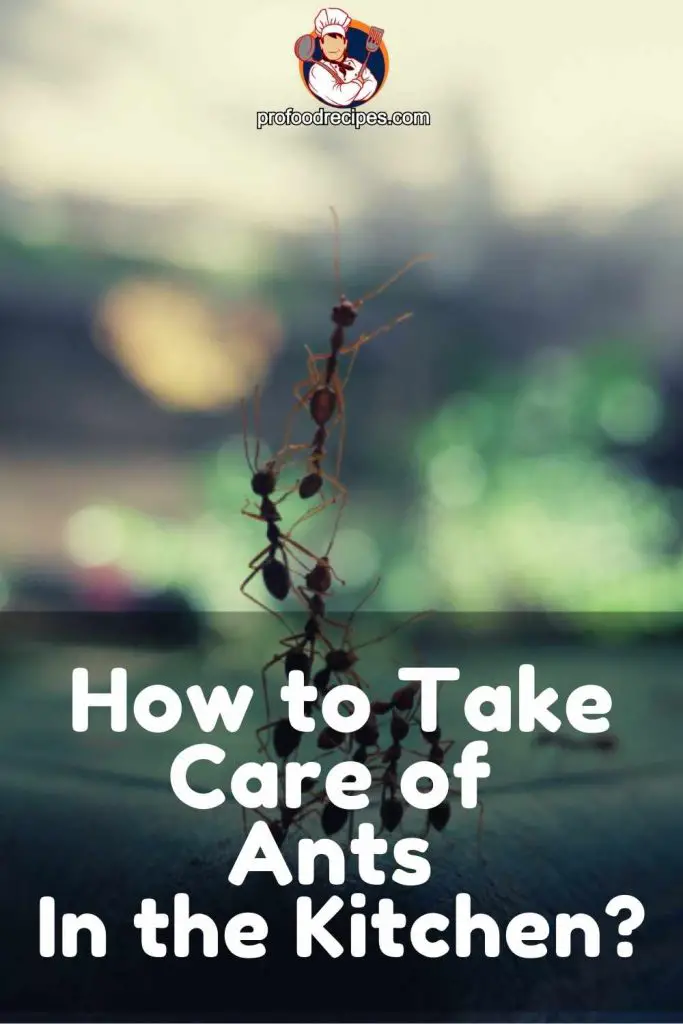Last Updated on June 7, 2022 by Amanda P. Brown
Making a solution of equal parts water and vinegar is required to get rid of ants in the Kitchen. Then, squirt it all over the Kitchen. Also, vinegar can use as a stand-alone method to get rid of ants and keep them away, killing and repelling them. Because vinegar retains its smell even after it has dried, it is an effective treatment for ant infestations.
Among the more common household pests is the ant, which is abundant in the Kitchen. Most importantly, they leave behind a trail of odors that help them follow one another. It’s this way that they mutate into a full-blown invasion. As they carry bacteria and can transmit it to food, you must protect your Kitchen from their presence. How to Take Care of Ants in the Kitchen has many facets. This article contains additional information.
How to Take Care of Ants in the Kitchen?
Table of Contents

Killing a single ant in the kitchen will not solve the issue. There will be a colony of egg-laying queen ants populating your kitchen, feasting on the surfaces of your cabinets, sinks, and counters. The techniques below will assist you in eliminating a kitchen ant infestation.
Step 1: Locate the Entry Point of the Ant Colony and Kill
Find the source and exit points of the scent trails by following them in both directions. Behind walls, cabinets, floors, or window frames, this colony may be hiding out. Apply insecticide directly to the ant nest if you locate it. This method will eradicate the issue at its source. Non-repellent pesticides should use at this stage because the ants will form another colony elsewhere if you try to exterminate them.
However, the ant colony can eradicate with bait stations if the ant nest is not easily accessible. Bait can traps work by luring ants with the scent of food and luring them back to the nest, where they ingest a poisonous bait. Ensure that the bait traps are set up in an area where ants return to the nest.
Besides, there are also gel baits that you can place directly on the ants’ path. If the bait isn’t an option, try spraying ant killer directly on the ants. Those ants are essential for transporting the insecticide back to the nest. Give the bait some time to work.
Step 2: Seal the Ant’s Entry Point
Seal the ant’s entrance that you spotted before. To prevent ants from re-infesting your kitchen, wait until the bait has had time to take effect before sealing up any holes. Caulk can use to fill in any cracks or crevices. Adding boric acid to cracks is an option as well.
Step 3: Eliminate the Remaining Ants
Get rid of any remaining ants with your kill-on-contact ant spray. Spraying in your own kitchen, on the other hand, necessitates special caution. Please thoroughly read the guidelines on the pesticide packaging before you begin spraying, and avoid using harmful spray on or near your food. Cleaning is necessary for any utensils that have been in contact with the spray.
Avoid using pesticides that contain synthetic chemicals in your kitchen. After eliminating the ants’ source, use common household objects to kill the rest. Applying the mixture of a few drops of dish soap and water to kitchen counters is highly efficient in eradicating the ants. – Because the soap will weaken the water’s surface tension and trap the ants, it will be easier to remove them from its surface.
Likewise, equal water and white vinegar mixture will interrupt the ant scent path. Since lemon juice and water have the same effect as water and vinegar, you can similarly use them. Wipe off all surfaces with recent ant activity with the solution.
Step 4: Restricts Ants from Coming Back
Now that you’ve gotten rid of the ants in the kitchen, it’s time to keep them from returning. Keeping your food in an airtight container is the best approach to keep the ants away. Also, avoid leaving food out. Some preventative steps, such as swiftly cleaning up food spills and washing dirty dishes, are self-evident.
Furthermore, keeping your kitchen sink as dry as possible is also essential since dampness might attract ants. Vacuuming, sweeping, and mopping are necessary to regularly remove crumbs and trash from the floor. Use strong garbage bags to keep leaks and holes at bay, and keep the lid on your trash container well sealed.
How Do You Take Care of Indoor Ants?

Indoor ants can be dealt with using the manner outlined below.
1. Lemon
You can discourage ants from entering the home by either placing lemon peels or squeezing lemons over the entry points they use. Also, you can add a little amount of lemon juice to the water used to clean the floor to keep ants at a distance.
2. Chalk
The most effective way to keep ants out of your house is to use chalk formed of calcium carbonate. The entrance can block by spraying with powdered chalk or drawing a line with it. Ants will be unable to enter the house if you draw a chalk line outside the structure. When you hang up the line, you need to take extra precautions to ensure that it is not within reach of any children who may be in the home.
3. Oranges
Make a mixture using a few orange peels and one cup of warm water to keep ants away from your home. You need to spray this paste around the areas that ants can enter and then wipe it down afterward. Additionally, you can place the orange peel right on the ant entrance or on the kitchen surfaces to repel them. This technique can serve as a natural ant repellent and keep ants away.
4. White Vinegar
Using white vinegar is the most effective method because ants dislike its smell. Combine equal amounts of white vinegar and water to generate the solution. After that, mix in a few drops of essential oil and give it a good swirl. Spray this solution in areas where ants are likely to enter your home. Once a day is an ideal frequency for this procedure. Although this approach will not be able to kill the ant, it will keep it from entering the zone.
5. Salt
Table salt is one of the most effective and inexpensive organic ant control methods. Bring a large pot of water to a rolling boil, then add salt, frequently stirring until the salt dissolves. You can spray the mixture into areas where ants are prone to penetrate.
6. Pepper
Sprinkle some pepper on the ant’s entry points will assist in getting rid of them. Cayenne pepper or black pepper works well here. Also, you can add pepper and water to a spray bottle and use that on the ant nests as well. Ants will not be able to get inside your home with this strategy.
7. Cinnamon
The ants dislike the scent of cinnamon. Cinnamon and cloves can be placed in ant-infested areas. Also, it’s a great way to keep the air in your home feeling clean and fresh. Cinnamon is widely recommended as a natural antidote for ant infestations. Also, a few drops of essential oil can add to cinnamon powder to make it more effective at warding off ants.
How Do You Mix Borax for Ants?
Sugar, 1.5 C warm water, and 1 1/2 tablespoon Borax are all you need to make ant bait. Put a few cotton balls that have been soaked in the solution in the area where the ants have made their mess. Because the ants are drawn to the sugar, they will take the Borax back to their colonies when they leave. After consuming the Borax, the ants die!
Final Verdict
There is no better location to stay home than your kitchen from an ant’s perspective. Ants are attracted to the kitchen since it is where they can locate the most food! Kitchen ants can be difficult to eradicate. Still, you can successfully eliminate these annoying pests from your home with the right combination of household repellents and heavy-duty ant baits. In this article, I’ve provided the greatest solution for How to Take Care of Ants in the Kitchen? I hope you find it helpful in maintaining your kitchen.
You May also Like to Read:
- How to Clean a Commercial Pizza Oven?-Expert Advice
- 10-Tips for How to Clean Copper Cookware
- Things You need to Know about Instant Pot: Guide for Users
